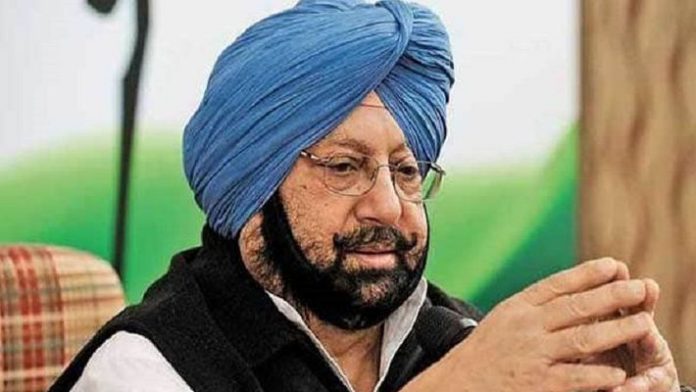
ASKS POLICE & DISTRICT ADMIN TO ENFORCE RESTRICTIONS STRICTLY & NOT ALLOW ANY RELAXATION AT BORDERS
Chandigarh, April 30: Amid grave concerns expressed by various DCs on several Covid infected persons coming in from outside the state in recent days, Punjab Chief Minister Captain Amarinder Singh on Thursday ordered village level quarantine in designated buildings, while issuing strict instructions for compulsory institutional quarantine, for both positive and negative cases, of all those coming from other states.
During a marathon Video Conference with DCs and SSPs/CPs of all the districts, the Chief Minister made it clear that no one coming from outside should be allowed to go home without completing the 21-day quarantine period, since symptoms generally show up after some time. Where possible, those found positive and negative should be segregated in different buildings altogether, he suggested, as a measure to check the further spread of the pandemic.
He directed the officials to work with Sarpanches to identify schools and other buildings for quarantine purposes in villages. The chief minister also appealed to Sarpanches and panchayats to increase village level surveillance to check further spread of the disease.
So far, 3525 pilgrims from Nanded (Maharashtra), and 153 students from Kota (Rajasthan) had returned to Punjab in the last 4 days, in addition to 3085 labourers received at the Fazilka-Rajasthan border, the meeting was informed. Of those who had returned from Nanded, test reports had so far been received for 577 persons, of whom 20% were found positive. Incidentally, of the 105 fresh cases reported in the state on Thursday, 98 were from outside.
The Chief Minister directed the DCs/SSPs to ensure that all those coming from outside download the COVA app to enable strict monitoring of their movement through Geo Fencing. He further instructed tracking and screening of all those who had come from outside the state on their own.
Apart from migrants and others, the meeting discussed the lockdown and relaxations in the state, as well as the procurement operations.
Ruling out any relaxation at the borders, which continue to remain strictly sealed, the Chief Minister said there was no question of allowing any buses to enter Punjab without permit/approval from the respective states which are sending vehicles to pick up their people. He directed the officers to ensure strict enforcement of the sealing at the borders, asserting that “we will not allow anyone to enter without proper procedure.” Some of the DCs said they were only allowing trucks with essentials to cross into their districts.
In Punjab, the Chief Minister attributed the infections to three sources – NRIs, Nizamuddin Tabligi Jamaat and Nanded returnees. While Punjabis returning home were welcome, they had to be strictly quarantined, said the Chief Minister, directing the officials to ensure not to allow any unauthorised entry at the borders. If we do not control the situation, no industry will open, he warned.
Stressing that industry was critical to reviving the state’s economy, he asked the DCs to explore ways of facilitating the same. Of the 2.5 lakh odd industries in the state, only around 3600 were eligible to open, and of these, so far a mere 1100 had chosen to open up, he pointed out.
The DC Ludhiana called for permission to industries not located in focal points and industrial estates to also open up, in designated areas as per the master plan. The Chief Minister agreed, pointing out that with 95% of the state’s industry in Ludhiana, it was important for them to start operating in order to revive the economy of Punjab. He also stressed the need for all milk plants in the state to work at full capacities.
The Chief Minister lauded the officers for the excellent management of the procurement operations, with more than 50% of the estimated grain already procured. A total of 68 lakh metric tonnes of wheat had been purchased so far, he disclosed. He assured the DCs that there was no shortage of gunny bags to handle the large quantities of wheat coming into the Mandis.
Describing the prevailing situation as unprecedented, of the kind he had not seen even in the 1965 and 1971 wars, Captain Amarinder warned that the problem was likely to get aggravated in the coming days, going by the global trends of the spread of the disease. India had been fortunate to keep the cases under control so far, he said.
Referring to the relaxation announced by him yesterday, the Chief Minister said maintaining law and order in the given situation was a difficult task but had to be done. He, however, told the officials that they should open up as and when, and in whatever manner they felt they could do so safely. He also directed the officials to ensure that nobody steps out without a mask.
All the DCs/SSPs/CPs updated the Chief Minister about the management of the relaxations in their respective districts, with shops being opened by rotation. In some districts, the DCs had judiciously chosen to open only the shops in the rural areas as of now, and had kept the decision to open up in urban areas on hold for a couple of days.
Even as all the three policemen contacts of ACP Anil Kohli were set to be discharged tomorrow after recovering completely from Covid symptoms, relaxations in Ludhiana were being implemented in a phase manner. The Ludhiana DC and CP suggested promotion of home quarantine for mild cases, in line with the new guidelines of the central government.
In Jagraon, the Market and Vyapar Committees had been asked to submit their schedules for opening of shops in compliance with the guidelines. In Nawanshahr, schools have bene identified with the help of sarpanches for creating village-level quarantine facilities.
Moga will start implementing relaxations by rotation from tomorrow, with the DC further informing the meeting that the Nestle plant, as well as the ancillary facilities associated with it, were working on full capacity.
Shops will start opening in rural areas by rotation from tomorrow in Ferozepur, with only grocery shops and chemists allowed to open initially in urban areas. The district has decided to depend on home delivery for some more time.
Officers from Jalandhar expressed concerns over threat of the spread of coronavirus due to the large number of migrants staying in ghetto-like conditions. In Fazilka, shellers and brick kilns had start functioning, the meeting was informed.
Participating in the meeting, Food and Civil Supplies Minister Bharat Bhushan Ashu said the government was working towards increasing the food packets/kits being distributed, particularly districts with large migrant populations.



